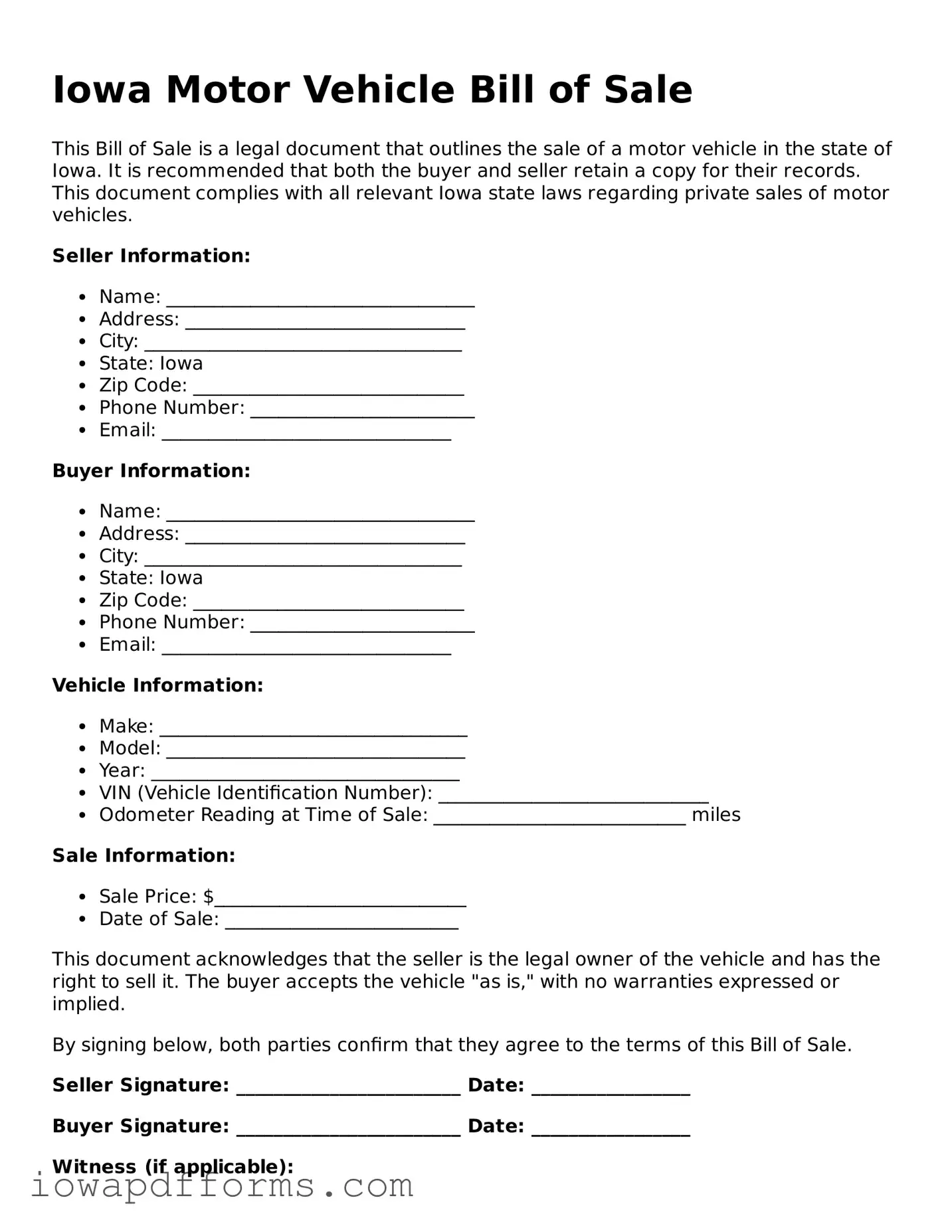The Iowa Motor Vehicle Bill of Sale form serves as a crucial document for transferring ownership of a vehicle. Similar to this form is the general Bill of Sale, which can be used for various types of personal property, not just vehicles. Like the Iowa form, a general Bill of Sale includes details such as the buyer and seller's information, a description of the item being sold, and the sale price. This document provides proof of the transaction and can protect both parties in case of disputes.
Another document that shares similarities is the Vehicle Title. The Vehicle Title is an official government document that proves ownership of a vehicle. While the Bill of Sale serves as a record of the transaction, the title is what is required to register the vehicle in the new owner's name. Both documents must be completed accurately to ensure a smooth transfer of ownership, and they often work hand-in-hand during the sale process.
For those looking to celebrate their love for classic vehicles, the Texas VTR 850 form provides a great opportunity to request special license plates for cars, trucks, or motorcycles that are 25 years or older. Vehicle owners can enhance their vintage rides through this application, making it a cherished part of their automobile experience. To get started with the process, you can check out more information at Texas Documents.
The Odometer Disclosure Statement is also comparable to the Iowa Motor Vehicle Bill of Sale. This document is often required when selling a vehicle to disclose the mileage at the time of sale. Both forms aim to protect the buyer by providing transparency about the vehicle's condition and history. When combined with the Bill of Sale, the Odometer Disclosure Statement ensures that the buyer is fully informed about what they are purchasing.
The Purchase Agreement for vehicles is another document that functions similarly. This agreement outlines the terms of the sale, including the price, payment method, and any warranties or guarantees. Like the Iowa Bill of Sale, a Purchase Agreement formalizes the transaction and can serve as a reference if any issues arise later. Both documents emphasize the importance of clarity and mutual understanding in the buying and selling process.
The Affidavit of Ownership is another related document, particularly when the seller cannot provide a title for the vehicle. This affidavit allows the seller to declare ownership and provide necessary details about the vehicle. While it is not a replacement for the Bill of Sale, it can supplement the transaction by verifying ownership when a title is unavailable, thus ensuring the buyer feels secure in their purchase.
The Vehicle Registration application is also similar in that it is a necessary step after a vehicle sale. While the Bill of Sale serves as proof of the transaction, the registration application officially records the new owner with the state. Both documents are essential for the legal transfer of ownership and help ensure that the vehicle is correctly registered in the new owner's name.
The Warranty Deed, while typically used for real estate, shares the concept of transferring ownership. Just as a Bill of Sale documents the sale of a vehicle, a Warranty Deed records the transfer of property ownership. Both documents protect the interests of the buyer and seller, ensuring that the transaction is legally binding and recognized by the state.
In the realm of business transactions, a Commercial Bill of Sale is quite similar to the Iowa Motor Vehicle Bill of Sale. This document is used for the sale of business assets, including vehicles. Both types of Bills of Sale serve the same purpose: to provide a record of the transaction and protect both parties involved. They include similar elements, such as the buyer and seller's information and a description of the asset being sold.
Lastly, a Sales Receipt can also be compared to the Iowa Motor Vehicle Bill of Sale. A Sales Receipt is a simple document that acknowledges payment for goods or services. Like the Bill of Sale, it serves as proof of the transaction. Both documents are essential for record-keeping and can be used as evidence in case of disputes or misunderstandings regarding the sale.

